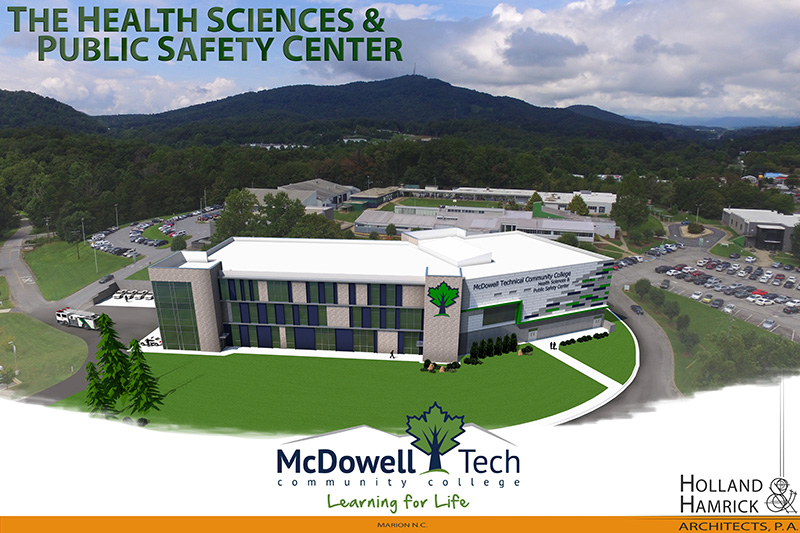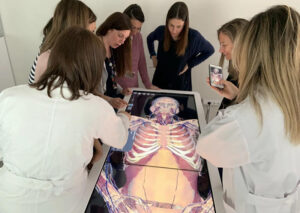McDowell Tech’s dream of a new Health Sciences and Public Safety Building inched closer to reality with the passage of the NC General Assembly’s 2023 budget on September 22nd. Included in the bill, which became law 10 days after its passage due to NC Governor Roy Cooper’s decision not to sign the bill, includes a $25,250,000 appropriation for the college’s proposed building.
According to the budget schedule, $10 M is set aside for fiscal year 2023-2024 for the new facilities, with the final $15.25 M slated for release during the 2024-2025 fiscal year. Funding for the project was proposed by Senator Warren Daniel, who represents McDowell County in the NC Senate. He was joined in support of the project by his colleagues in the NC House, Representatives Dudley Greene and Jake Johnson.
“The board of trustees and I are beyond excited for the opportunity this represents for McDowell Tech,” said Ryan Garrison, Interim President at McDowell Tech. “Now the hard work begins. We know that we will need to raise additional funds to equip the building and to cover increases in construction costs that have occurred since our initial architectural projections, but these funds will cover the lion’s share of the costs and gets us on our way to making the dream a reality.”

Traditionally, county governments in North Carolina have been responsible for construction, maintenance and other upkeep for community college facilities, as dictated by NC General Statutes. The state appropriation for this facility will significantly reduce McDowell County’s construction burden for the cost of a new facility.
The proposal for the new Health Sciences and Public Safety Building arose out of surveys and research for the college’s latest facilities master plan, passed by the MTCC Board of Trustees in March 2022. The new building was identified as a top priority to allow expansion of both health science and public safety programs and to enhance instructional and clinical quality in these areas.
“We know that our health science and public safety programs are among the best in the state,” said Stacy Buff, Vice-President for Workforce Development. “But the size and quality of our programs is limited somewhat by our current facilities, which are woefully inadequate. In our Basic Law Enforcement Building, for example, we have to put out buckets and get out mops each time it rains. It’s hard to focus on quality instruction and continuous improvement when you’re spending your time emptying buckets of rainwater and dodging puddles of water in the classroom.
“This new facility will allow us to expand class offerings and provide space and equipment for enhanced instruction in our basic law enforcement classes as well as public safety classes for corrections employees, emergency medical service employees, fire and rescue workers and many others,” he said.
Valerie Dobson, Vice-President of Academics and Student Services and Chief Academic Officer at MTCC, agrees. “Expanding our health science and public safety programs into this new space will allow MTCC Health Science and Public Safety Programs to essentially double their capacity to offer state of the art training through using active learning strategies and simulation for health professionals in our county and region,” she said.
Recently, the college was fortunate to be approved to begin offering a standalone associate degree in nursing and has enrolled the inaugural classes of students in the program. McDowell Tech was previously part of a consortium with two other community colleges to offer this degree, which allows graduates to sit for nursing exams that ultimately lead to becoming a registered nurse. In this program and in other nursing programs, like nurse aide and practical nursing, classroom and clinical space have always been limiting factors in how many students the college can accept each year.
Expanding health science facilities will allow the college to increase the number of students in the associate degree and practical nursing education programs to a total of approximately 90 students per year. The demand for graduates of these programs is at all-time highs, with an equal level of student interest in the programs. For several years, there have been waiting lists for entry into one or both programs, with graduates commanding average salaries of $55,286.
The new building will also allow for more clinical simulation, so that nursing and other health science programs can gain practical experience before entering hospital or other emergency settings working with live patients. It will also provide gymnasium space for general physical education classes, as well as physical agility testing for law enforcement officers and others.
The college’s newly approved 911 Communications and Operations Technology Program will be among the first beneficiaries of the health science and public safety expansion. The initiation and expansion of this program will fill a significant void for employee training in 911 communications and operations centers throughout the county, region and state and will be the first of its kind in Western North Carolina.
Beyond the health science and public safety classes to be housed in the new facility, completion of the new building will have secondary benefits for two early colleges already co-located at McDowell Tech—McDowell Early College and McDowell Academy for Innovation. As health sciences and public safety programs vacate existing space and move into the new building, classrooms for each of the early colleges can become more centralized in what for them will be newer space. Currently, early college classes are scattered throughout some of the oldest buildings on campus.
“Workforce education is a central mission of McDowell Tech and the North Carolina Community College System, and this building will be the embodiment of workforce development in health sciences and public safety in this region,” said Garrison, the Interim MTCC President. “Most of the programs we will teach in this building, whether offered as a curriculum degree or certificate or continuing education program, will have a basic emphasis on high-demand, critically-needed vocational, career and technical programs, and will allow continued economic growth in this region and throughout the state of North Carolina. We greatly appreciate Senator Daniel and Representatives Green and Johnson and their colleagues in the NC House and Senate for partnering with the college and McDowell County Government to help us provide this training.”



